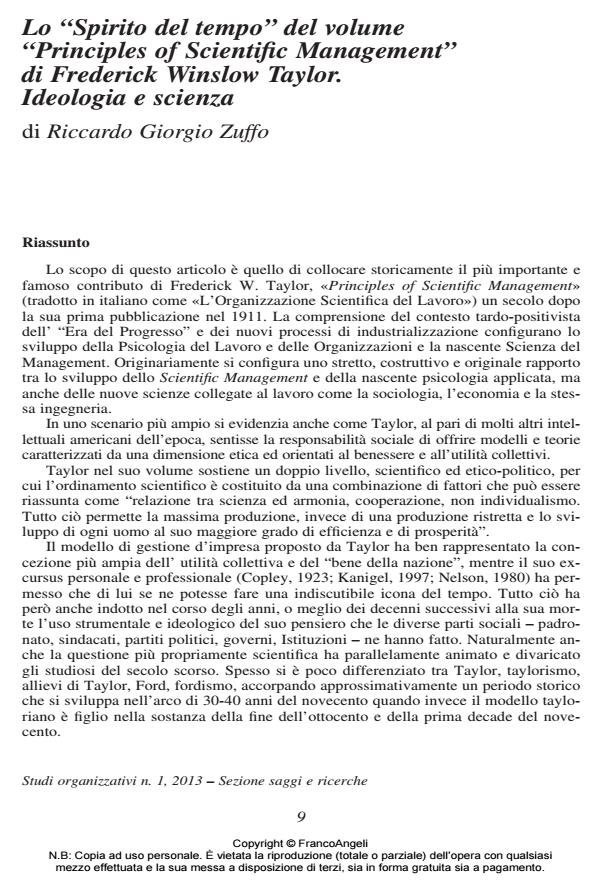The "Spirit of Time" in "Principles of Scientific Management" by Frederick Winslow Taylor. Ideology and science
Journal title STUDI ORGANIZZATIVI
Author/s Riccardo Giorgio Zuffo
Publishing Year 2013 Issue 2013/1
Language Italian Pages 23 P. 9-31 File size 520 KB
DOI 10.3280/SO2013-001001
DOI is like a bar code for intellectual property: to have more infomation
click here

FrancoAngeli is member of Publishers International Linking Association, Inc (PILA), a not-for-profit association which run the CrossRef service enabling links to and from online scholarly content.
The aim of this study is to place historically the most relevant and famous contribute by Frederick W. Taylor, «Principles of Scientific Management», at a century since its publication in 1911. The understanding of the late positivist context of "Progressive Era" and the new processes of industrialization shape some topics related to the development of Work and Organizational Psychology and the nascent Science of Management. At the beginning there is a close, constructive and original relationship among the development of Scientific Management and, on the other hand, the nascent applied psychology and new sciences linked to work such as sociology, economy and engineering itself. It is reported how Taylor, like other American intellectuals of the time, felt the social duty to offer models and theories characterized by an ethic dimension oriented to collective utility and wellness. This two-level, scientific and ethic-politic, rising from the reading of «Principles of Scientific Management» is theorized and supported by Taylor himself. In his opinion the scientific order is in fact a combination of factors that can be summarized as a "relation between science and harmony; cooperation, not individualism. This drives to the maximum output, in place of restricted output and the development to each man to his greatest efficiency and prosperity". The model of "shop management" proposed by Taylor has well shown the broader conception of "wellness of nation", while his personal and professional excursus (Copley, 1923; Kanigel, 1997; Nelson, 1980) raised him as an icon of his time. However all this has influenced, in the years and decades following his death, the instrumental and ideological use of his thought that different social parts - employers, labor unions, parties, governments, institutions - did. However also the scientific question rising from his proposal has animated and separated the scholars during the XX century. Taylor, taylorism, Taylor’s cooperators, Ford, fordism have been often considerated joint, including an era of 30-40 years of the XX century, although the taylorian model is instead a heritage of the end of XIX century and the beginning of the following one. We think that is historiographically important and even worthwhile to propose again an analytic reflection about the "context" and the text that represents the most famous and the most politically relevant work in the history of management: this especially in the scientific and cultural actuality that often proposes decontextualized technicalities, without emphasizing the widest outcomes.
Keywords: F.W. Taylor, Principles of Scientific Management, Origin of Work Psychology, Psychotechnics, Management, Ideology and Psychology.
Riccardo Giorgio Zuffo, Lo "Spirito del tempo" del volume "Principles of Scientific Management" di Frederick Winslow Taylor. Ideologia e scienza in "STUDI ORGANIZZATIVI " 1/2013, pp 9-31, DOI: 10.3280/SO2013-001001